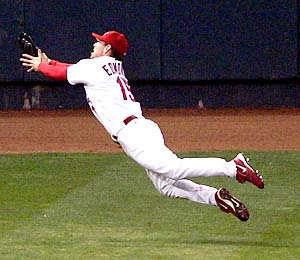I know it is cliche, and that every baseball writer pens the same article whenever a big name retires. But these opinion pieces are still fun to write and argue about. So argue away.
Within the past week, two notable hitters hung up their spikes. Gary Sheffield was forced to admit (much like Barry Bonds, Jermaine Dye and other aging DH-only players quickly being obsoleted in the fast, new, young MLB) that no team would hire him after sitting out all of 2010 and officially filed the paperwork with the league. Meanwhile, Jim Edmonds retired from a lingering achilles heel injury that prevented him from suiting up in 2011.
For the sake of this article, we will exclude consideration of the fact that Sheffield has admitted to PED/Steroids use and thus probably faces little chance of making the hall. Lets talk about their performances on the field.
Case 1: Gary Sheffield
Sheffield hails from the famous Hillsborough High School in Tampa, which also produced the likes of Dwight Gooden, Carl Everett and (infamously) Elijah Dukes. Sheffield’s career numbers are strong. He retires with a CAREER OPS+ of 140. That’s essentially an entire career of production at the average level of what Ryan Zimmerman gave the Nats last season. He hit more than 500 homers while also having more than 250 stolen bases. He has a career slash line of .292/.393/.514, which is also great. His hall of fame monitor and standard scores (Bill James’ creations that try to measure whether a player is HoF worth) both easily put him in. His closest comparison on baseball-reference is Mel Ott. That’s heady company.
Awards: 9 times an all star, 7 times getting MVP votes (a 2nd, two 3rd and a 6th place finish). 5 silver sluggers. Played 3B early, RF middle and LF/DH late in his career. His best season was in 1997, finishing with a ridiculous 189 OPS+ for the Marlins but only finishing 6th in the MVP voting.
Beyond the Boxscore printed out an interesting Visual Hall of Fame graphic that essentially shows that Sheffield’s best seasons of his 22-yr career were in the latter part of his career, consistent with a steroids user who was able to beat back the hands of time and not diminish as he aged. In the same way that Bonds did not tail off as he entered his late 30s.
Regardless of the steroids, I think he’s a hall of fame player. He was a feared, ferocious hitter who clearly had 5-tools (though not quite at the 5-tool level of someone like Willie Mays or Ken Griffey). He was a game changer who bounced around the league but produced wherever he was. Unfortunately because of a prickly relationship with sports writers and implications in the BALCO scandal, his only chance of entrance will be 30 years from now by a veteran’s committee. He’ll be on a very busy 2014 hall of fame ballot (other first timers on that ballot include near locks Greg Maddux, Frank Thomas, and Tom Glavine, along with borderline cases Jeff Kent and Mike Mussina).
Case 2: Jim Edmonds
Edmond’s case is less about pure offensive merit but weighing the benefits of a player who can produce at a high offensive level AND provide fantastic defense. Edmond’s career offensive numbers are good but not amazing; in 17 major league seasons he hit 393 homers, had a respectable career slash line of .284/.376/ .527, and a career OPS of 132.
Those numbers compare pretty favorably to Sheffield’s career lines when you consider that Edmonds was considered among the best 2-3 outfielders in the game for the middle 10 years of his career. He earned 8 gold gloves for his work in centerfield and has a litany of high-light reel catches to his credit. He was excellent defensively but this did not correlate to raw speed on the base-paths; he retired with only 67 stolen bases for his career, averaging just four a year. His diving catches helped contribute to his demise; he was frequently injured, missed the entirety of 2009 and hung it up because he was not going to be medically cleared to play this year.
Career Achievements: 8th in his Rookie voting, 4 time all star, 6 times receiving MVP votes (a 4th and a 5th place vote his best achievements).
Bill James’ Hall of Fame metrics are not quite as kind to Edmonds; he falls short in both the Monitor and the Standard. His most similar player comparison is to one Ellis Burks, not really a flattering comparison.
Is he a hall of famer? I say “probably.” When grading the defensively minded players (shortstops, catchers and athletic center fielders) you have to balance offensive and defensive. With Edmonds, he’s nearly the hitter of Sheffield with fantastic defense. I’m concerned by the lack of MVP consideration, and lack of all-star selections. If a player isn’t routinely considered among the best players in the game, how can he be a hall of famer?
He’ll be on the 2015 ballot along with first timers (and locks) Randy Johnson, Pedro Martinez and John Smoltz. So he may have to wait to get in but he should merit it.
